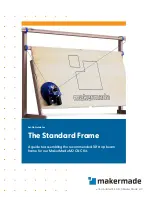
22
| English
2 609 004 157 | (11.5.10)
Bosch Power Tools
Mounting/Replacing the Application Tool/
Accessory
If required, remove an already mounted applica-
tion tool/accessory.
For removing the application tool/accessory
loosen the screw
10
with the allen key
11
and re-
move the tool.
Mount the application tool/accessory (e.g.
plunge cut saw blade
9
) in such a way on the
tool holder
7
that the openings of the tool en-
gage into the cams of the tool holder.
For a safe and fatigue-free working position it is
possible to position the application tools/acces-
sories in any snap-in positions on the tool hold-
er. Position the tool in such a way that the de-
pressed centre points downwards (marking on
the tool is readable from above, see figure on
the graphics page).
Use the screw
10
to fasten the application
tool/accessory. Tightly fasten the screw
10
with
the allen key
11
.
f
Check the tight seating of the application
tool/accessory.
Incorrect or not securely fas-
tened application tools/accessories can come
loose during operation and pose a hazard.
Mounting/Replacing a Sanding Sheet on the
Sanding Plate
The sanding plate
12
is fitted with Velcro back-
ing for quick and easy fastening of sanding
sheets with Velcro adhesion.
Before attaching the sanding sheet
13
, free the
Velcro backing of the sanding plate
12
from any
debris by tapping against it in order to enable
optimum adhesion.
Position the sanding sheet
13
flush alongside
one edge of the sanding plate
12
, then lay the
sanding sheet onto the sanding plate and press
firmly.
To ensure optimum dust extraction, pay atten-
tion that the punched holes in the sanding sheet
match with the holes in the sanding plate.
To remove the sanding sheet
13
, grasp it at one of
the tips and pull it off from the sanding plate
12
.
You can use all sanding sheets, fleece pads/
polishing cloth pads of the Delta 93 mm series
of Bosch accessory program.
Sanding accessories, such as fleece pads/pol-
ishing cloth pads, are attached to the sanding
plate in the same manner.
HCS plunge
cut saw
blades, wood
Wooden materials,
soft plastics
Smaller separating and plunge cuts;
Example: Cut-outs in furniture for cable con-
nections
BIM plunge
cut saw
blades, metal
Metal (e.g. unhard-
ened nails, screws,
smaller profiles),
non-ferrous metals
Smaller separating and plunge cuts;
Example: Shortening narrow profiles, cutting
fastening elements such as staples
HM-Riff seg-
ment saw
blade
Grouting joints, soft
wall tiles, glass-fibre
reinforces plastic
and other abrasive
materials
Cutting and separating close to edges, in cor-
ners or hard to reach areas;
Example: Removing grouting joints between
wall tiles for repair work, cutting openings in
tiles, gypsum boards or plastic
HM-Riff delta
plate
Mortar, concrete
remainders, wood,
abrasive materials
Rasping and sanding on hard surfaces;
Example: Removing mortar or tile adhesive
(e.g. when replacing damaged tiles)
Scraper, rigid Carpets, coverings
Scraping on hard surfaces;
Example: Removing carpet and tile adhesive
Accessory
Material
Application
OBJ_BUCH-1170-002.book Page 22 Tuesday, May 11, 2010 3:36 PM
















































